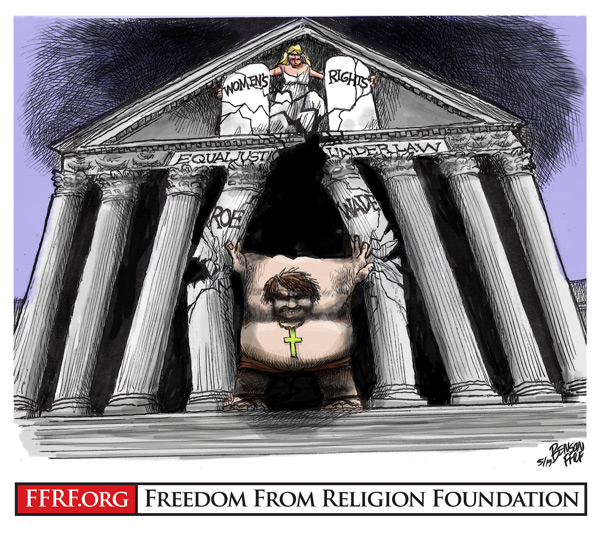
The U.S. Supreme Court heard arguments March 4 in an important abortion challenge — and the Freedom From Religion Foundation is asking it to respect precedent and protect women’s rights.
FFRF has joined 71 other groups in filing a friend-of-the-court brief in the case, which argues that the court must take into account the economic and social circumstances of the women who will suffer the negative consequences of a Louisiana law under consideration. In June Medical Services v. Russo, the court is revisiting an issue that was litigated and settled just a few years prior. The Supreme Court held in 2016 that a Texas law created an “undue burden” to access safe, legal abortion. FFRF is calling for the Supreme Court to stand by its 2016 decision.
The current case involves a Louisiana law that requires physicians who provide abortions to hold “active admitting privileges” at a hospital located within 30 miles of the clinic. The purpose and effect of this provision has been to limit the abortion providers in Louisiana to just one remaining clinic. The Supreme Court had ruled an identical provision unconstitutional in Texas four years ago when Justice Anthony Kennedy was on the bench.
“The Religious Right has the expectation that there’ll be an overturning of settled law due to the new justices,” says FFRF Co-President Annie Laurie Gaylor. “The Supreme Court should honor previous rulings on the subject and ensure reproductive freedom.”
Chief Justice John Roberts is likely to be the deciding vote this time. During oral argument, he asked whether the legal analysis “is a factual one that has to proceed state by state,” indicating that he may view the court’s decision as limited to the facts of the underlying case, ignoring broader issues at stake. Such a determination would likely perpetuate attempts by other states to use doctor admitting privileges as a weapon to limit abortion access.
Other conservative justices were more overt in their disdain for the claims made by the doctors challenging the Louisiana law. In response to a statement that the doctors should be able to challenge the law as third parties because they are the ones being directly regulated, Justice Samuel Alito remarked, “Well, that’s amazing.”
The brief that FFRF signed, which was authored by the National Women’s Law Center, asserts that abortion restrictions like those in Louisiana limit women’s autonomy and dignity by retreating to an old notion that women are solely destined for the home and rearing of children. It also highlights the physical impact on women, pointing out: “Forcing women and others who can become pregnant to carry a pregnancy threatens their health, safety, and bodily autonomy, often with grave results.”
Religion has been the main force behind laws that limit the rights of women when it comes to contraceptives and abortion, compelling the Freedom From Religion Foundation to often speak out on the issue. The state/church watchdog urges the U.S. Supreme Court to not fall for the specious anti-abortion arguments of the Religious Right.

